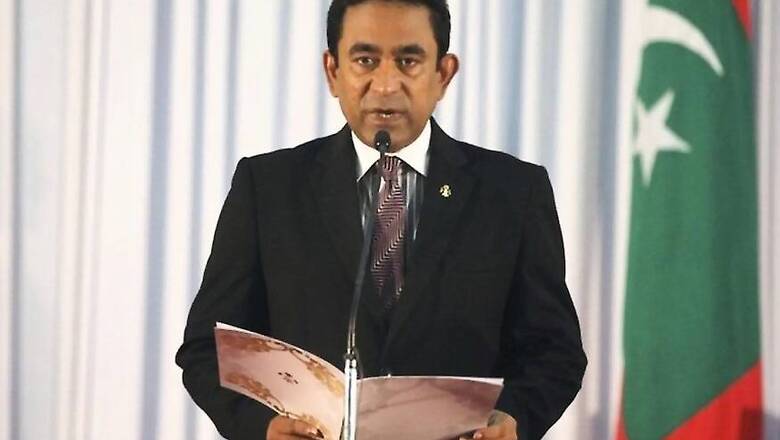
views
Male: The Maldives opposition leader and two Supreme Court judges were arrested early Tuesday hours after the government declared a state of emergency in the Indian Ocean nation increasingly in turmoil in the days since the court ordered several jailed politicians to be freed.
The charges against opposition leader Maumoon Abdul Gayoom include bribery and attempting to overthrow the government, his lawyer, Maumoon Hameed, said on Twitter. Gayoom was president from 1978 to 2008, when Maldives became a multiparty democracy, and is the half brother of the current president, under whose rule the archipelago has lost many of its democratic gains.
The 15-day emergency decree issued late Monday gives the government sweeping powers to make arrests, search and seize property and restricts freedom of assembly, officials said.
Soon after the declaration, security forces stormed into the Supreme Court building, where Chief Justice Abdulla Saeed and judge Ali Hamid were arrested. The charges against them have not been specified. The whereabouts of the court's other two judges were not known Tuesday morning.
Since the surprise, unanimous ruling last week ordering the release of imprisoned opposition leaders, President Yameen Abdul Gayoom has lashed out at the court, opposition protests have spilled into the streets of the capital, Male, and soldiers in riot gear have stopped lawmakers from meeting in the parliament building.
In a statement issued after the state of emergency was announced on state television, Yameen said "though certain rights will be restricted, general movements, services and businesses will not be affected."
In a letter to the court released by the president's office, Yameen said the court's order to release prisoners had encroached on the powers of the state and was an "infringement of national security and public interest." He urged the court to "review the concerns" of the government.
The government has also said the court has not properly responded to letters citing problems with implementing its order, including that the cases against the political prisoners are at different legal stages. A Supreme Court statement on Sunday said "there are no obstacles in implementing the ruling ... and that this has been informed to the Prosecutor General's office."
The government did not comment on soldiers entering the Supreme Court building or on Gayoom's arrest, but the president's main rival, who lives in exile, urged people not to obey what he called an "unlawful order."
"This declaration is unconstitutional and illegal," former President Mohamed Nasheed, the country's first democratically elected leader, said in a statement.
Nasheed was one of the opposition leaders the Supreme Court had ordered freed, ruling that the guilty verdicts had been politically influenced.
The United Nations, United States and other foreign governments have urged the Maldives to respect the court order.
The U.S. also strongly criticized the emergency decree, which State Department spokeswoman Heather Nauert said also imposes travel restrictions.
Yameen has "systematically alienated his coalition, jailed or exiled every major opposition political figure" since his election in 2013, Nauert said.
She called on Yameen, the army, and police to comply with the rule of law, and for the constitutional rights of Maldivians to be restored.
In addition to ordering the release of the political prisoners, the court also reinstated 12 lawmakers who had been ousted for switching allegiance to the opposition. When those lawmakers return, Yameen's Progressive Party of the Maldives will lose its majority in the 85-member parliament, which could result in the legislative body functioning as a rival power to the president.
Known for its luxury tourist resorts, the Maldives became a multiparty democracy 10 years ago after Maumoon Abdul Gayoom's rule, during which he was repeatedly the only candidate for the presidency.
Nasheed won the nation's first democratic election in 2008 but resigned during his term following protests over the arrest of a judge. He lost the 2013 presidential election to Yameen, then was convicted under Maldives' anti-terrorism laws over ordering the judge arrested. The trial was widely condemned by international rights groups.
He was granted medical leave while serving 13 years in prison and traveled to Britain, where he has lived since 2016 since being granted asylum.
Nasheed said last week after the court ruling that he would mount a fresh challenge for the presidency this year.
Yameen had been set to run for re-election virtually unopposed, with all of his opponents either jailed or exiled.




















Comments
0 comment